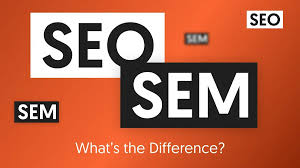
In the dynamic world of digital marketing, Search Engine Marketing (SEM) and Search Engine Optimization (SEO) play pivotal roles in enhancing online visibility, driving traffic, and ultimately boosting conversions for businesses.
SEM involves paid advertising to promote websites by increasing their visibility on search engine results pages (SERPs). Through platforms like Google Ads, businesses can bid on keywords relevant to their products or services. When users search for these keywords, the ads appear prominently, driving targeted traffic to the website.
SEM offers instant results as ads are displayed to users actively searching for specific terms. It allows businesses to reach a wider audience and target potential customers based on demographics, interests, and online behaviour. By monitoring campaign performance and adjusting strategies accordingly, businesses can maximise ROI through SEM.
SEO focuses on improving organic search rankings by optimising website content, structure, and backlinks. By following search engine guidelines and best practices, businesses can enhance their online presence without relying on paid advertisements. SEO aims to increase website visibility for relevant searches over time.
Effective SEO involves keyword research, content creation, on-page optimisation, technical improvements, and link building. By providing valuable content that aligns with user intent and search algorithms, websites can rank higher in SERPs organically. SEO is a long-term strategy that requires continuous monitoring and adaptation to stay ahead of competitors.
While SEM delivers immediate results through paid advertising, SEO builds a strong foundation for sustainable growth in organic search rankings. The synergy between SEM and SEO can amplify digital marketing efforts by targeting both short-term conversions and long-term brand visibility.
By integrating SEM campaigns with SEO strategies, businesses can maximise their online presence across paid and organic channels. This holistic approach ensures comprehensive coverage in search engine results while optimising budget allocation for optimal results.
SEM and SEO are indispensable tools in the digital marketing arsenal. By leveraging the strengths of both disciplines strategically, businesses can drive qualified traffic to their websites, improve brand awareness, and achieve measurable success in the competitive online landscape.
In the realm of Search Engine Marketing (SEM) and Search Engine Optimization (SEO), conducting thorough keyword research is a fundamental step to identify relevant terms that resonate with your target audience. By understanding the specific keywords and phrases that users are searching for, businesses can tailor their content to align with user intent and improve visibility in search engine results. Effective keyword research not only helps in creating valuable and engaging content but also enhances the overall performance of SEM and SEO strategies, driving organic traffic and boosting conversions.
To enhance the effectiveness of your Search Engine Marketing (SEM) and Search Engine Optimization (SEO) strategies, it is crucial to optimise your website’s meta tags, headings, and content with targeted keywords. By incorporating relevant keywords into these elements, you can improve your website’s visibility and relevance in search engine results. Meta tags provide search engines with information about your web pages, while headings structure your content for both users and search engines. Ensuring that your content is rich in targeted keywords helps search engines understand the context of your website and its relevance to user queries. This optimisation technique plays a key role in driving organic traffic and improving the overall performance of your digital marketing efforts.
Creating high-quality and engaging content that provides genuine value to your target audience is a fundamental tip in SEM and SEO strategies. By developing content that addresses the needs, interests, and pain points of your audience, you not only enhance your website’s visibility in search engine results but also establish credibility and trust with potential customers. Valuable content not only attracts organic traffic through SEO but also complements SEM efforts by improving ad relevance and user engagement. Ultimately, prioritising quality content creation is key to building a strong online presence and driving meaningful interactions with your audience.
Building backlinks from reputable websites is a crucial strategy in SEM and SEO to enhance your site’s authority and credibility. By earning links from trusted sources, you signal to search engines that your content is valuable and trustworthy, which can positively impact your search rankings. Backlinks act as endorsements from other sites, validating the quality of your content and boosting your site’s visibility in search results. Focusing on acquiring backlinks from reputable websites not only strengthens your site’s authority but also establishes a network of connections that can drive organic traffic and improve overall online presence.
Utilising descriptive alt text for images is a crucial tip in SEM and SEO strategies. By providing detailed alternative text for images, businesses not only improve website accessibility for visually impaired users but also enhance SEO by providing search engines with valuable context about the content of the image. This practice helps search engines better understand the relevance of images to the overall content of the webpage, ultimately boosting organic search rankings and improving user experience simultaneously.
Monitoring and analysing your website’s performance using tools like Google Analytics is a crucial step in maximising the effectiveness of your SEM and SEO strategies. By tracking key metrics such as website traffic, user behaviour, conversion rates, and more, you can gain valuable insights into the impact of your digital marketing efforts. This data allows you to identify strengths, weaknesses, and opportunities for improvement, enabling you to make informed decisions to enhance your online presence and drive better results. Regularly reviewing analytics ensures that you stay on top of performance trends and adapt your SEM and SEO tactics accordingly to achieve optimal outcomes.